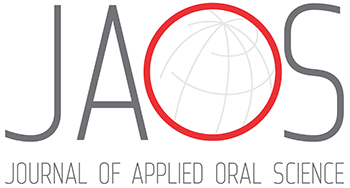Abstract
Nonsyndromic oral clefts are considered a problem of public health in Brazil, presenting a multifactorial etiology that involves genetic and environmental components, such as maternal alcohol consumption. Several candidate genes have been investigated to identify some association with nonsyndromic clefts risk. The epidermal growth factor (EGF) gene is implicated in the normal craniofacial development and its functional +61 A>G polymorphism has been related to cancer susceptibility. It has been suggested that cancer and oral clefts may share the same molecular pathways.
Objective
Our goal was to evaluate the association between the EGF+61 A>G polymorphism and nonsyndromic oral clefts susceptibility.
Material and Methods
The case-control study included 218 cleft cases and 253 controls from Brazil. The control group was comprised of individuals without congenital malformations, dental anomalies and family history of clefts. The cleft phenotypes and subphenotypes were determined based on clinical examination. Genomic DNA was extracted from oral mucosa cells obtained by mouthwash. The EGF+61 A>G polymorphism genotype was determined by polymerase chain reaction-restriction fragment length polymorphism.
Results
We noticed the association between maternal alcohol consumption during pregnancy and cleft occurrence. The A allele and AA genotype were over-represented in cleft cases compared with control group when we considered the bilateral cleft lip with or without cleft palate (CL±P) cases, cleft cases with tooth agenesis and cleft cases presenting family history of cleft, but the differences were not statistically significant. Contradictorily, the G allele was higher in cleft palate only (CP) cases than in control group, showing a borderline p value. Comparing the different cleft phenotypes, we observed statistical differences between CP and CL±P cases. Our data suggest the EGF+61 A>G polymorphism was not related with nonsyndromic oral clefts susceptibility in a Brazilian population, but supported the different genetic background between CL±P and CP. Moreover, we confirmed the potential effect of maternal alcohol intake on cleft risk in our population.
Nonsyndromic oral clefts; Cleft subphenotypes; EGF; Polymorphism

